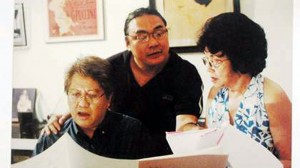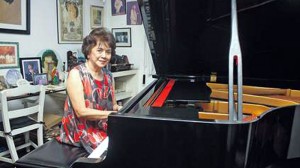Yesterday: Diva in residence
When she walks into a room, it is always with flourish and drama. A true diva knows how to make an entrance.
Clad in a miniskirt, Fides Cuyugan-Asensio descends a spiral staircase like a debutante meeting guests in her living room—an attractive woman who’s equally proud of being a coloratura soprano and a senior citizen.
She is always the first to admit that she is a colorful mix of contradictions. Fides, whose text messages often read like eloquently composed hand-written notes, straddles the modern and the traditional, high art and pop culture—with effortless élan.
The self-confessed “opera snob” brought classical and Broadway music to Philippine television via her landmark shows “Sunday, Sweet, Sunday” (1969 to 1974) and “A Little Night of Music” (1989 to 2001).
She volunteered that she has also “flirted” with cinema— most famously in Peque Gallaga’s 1982 opus, “Oro, Plata, Mata,” and more recently in Loy Arcenas’ Cinemalaya- and Busan-winning “Niño.”
Article continues after this advertisementSelf-deprecatingly, Fides told the Inquirer that she is puzzled by the attention she has received because of “Niño.” She quipped: “I think I was just lucky that the film required an 80-year-old who could sing opera.”
Article continues after this advertisementShe recalled that the last time she got as much press was for her graduation recital at the Philippine Women’s University in 1951. Only 20 at the time, she impressed a well-heeled crowd, which included her teacher, Felicing Tirona, and National Artist for Music Jovita Fuentes, who had played Cio-Cio San in an Italian staging of “Madame Butterfly.” Her parents, Dr. Gervasio Santos Cuyugan and Jacinta Belza, who were also present, couldn’t have been prouder.

FIDES works on “Spoliarium” with composer Ryan Cayabyab (left) and stage director Alex Cortez in 2003.
Fides landed on the front page of the Manila Times, which declared, “A star is born.” More significantly, she was praised by the grand dame Jovita, who proclaimed that the young soprano would “inherit my mantle someday.”
Coincidentally, Jovita recorded “Ay Kalisud” for Odeon Records in Germany; it is the same folk song that Fides performed in the finale scene of “Niño.” Jovita and Fides seem to be bound by the song—common threads of grief and quiet fortitude ran through both their lives.
Reality movie
“I used to sing ‘Ay Kalisud’ to my husband (Manuel Asensio Jr.) after he had a stroke on Easter Sunday 2000,” Fides recounted. When she embarked on a concert tour in the United States, she would regularly call her bed-ridden husband and sing to him on the phone. “He was like a 6-month-old baby then. He was quiet… but I knew he was listening because he would make noises whenever I stopped.” He passed away on Dec. 28, 2001.
Whenever her character sang to her sick brother (played by Tony Mabesa) in “Niño,” Fides would fight tears of recollection. “It hit too close to home. It was a reality movie for me.”
She is certain that she and Manuel, whom she married in 1954, were a perfect fit. He allowed her to pursue her career even while she raised their two sons, Dennis and Manuel III. To be sure, she was a woman ahead of her time, a working mom in the 1950s.
Although she was a classically trained soprano (she graduated as a voice scholar from the Curtis Institute of Music in Philadelphia in 1955), she had no qualms about appearing in the then-burgeoning medium called television.
She reminisced: “In the 1960s, I did commercials for Caltex, Vicks VapoRub, Sunta Orange, Silver Swan Soy Sauce and Bic Ballpen. TV needed someone who could speak good English, had stage training and could memorize long lines in an instant.”
‘Sacrilege’
Her friends from the opera world ranted that she had committed sacrilege. She remained undaunted. “I was criticized left and right. But who were they to talk? It was an honest living. I made P300 to P600 [per ad].”
Her stint as product endorser invariably led to an offer, from ABS-CBN, to host a TV show. Thus, the groundbreaking program “Sunday, Sweet, Sunday” was born.
How did she convince a major network to let her perform opera on noontime TV—something that the producers of “ASAP” and “Party Pilipinas” today wouldn’t dare consider?
“Everyone thought Sunday noontime was a dead time slot,” Fides said. “But it clicked for us.” She and cohost Jimmy Melendrez performed excerpts from both the classics (“La Traviata,” “Romeo and Juliet”) and Broadway (“Carousel,” “Camelot”)—and, in the process, introduced the songs’ timeless beauty to the Filipino masses.
Talent fees for guests on “Sunday” was P70 per episode, she gasped. “My weekly salary was P3,000 but I did everything. I wrote the script. I designed the costumes. The opera singers were happy to join us because the show was a good venue for them.”
And it was quite a run.
“Since we came on at lunchtime, we had the privilege of announcing on local television the moon landing of Neil Armstrong and the Miss Universe win of Gloria Diaz on the same day in 1969,” she pointed out.
A first
The show also holds the distinction of airing the country’s first broadcast in color, she said. “It was called Colorcast and we performed ‘Madame Butterfly,’ which was ideal because of its beautiful costumes and sets.”
Fides said the program taught her never to underestimate the power of the so-called boob tube to educate and enlighten—or to confuse and complicate.
She related: “Once, we used a smoke machine while singing ‘What the World Needs Now is Love.’ The following day, we got an angry letter from a viewer who scolded us for depicting a pot session.”
When martial law was declared in 1972, the show was momentarily discontinued, as its home studio was padlocked.
During the martial law era, Fides hosted another TV show, “Zing” (directed by Al Quinn), and which later became “Curtain Call.”
“Then it was simply curtains for us,” she hollered.
She temporarily bid TV farewell, only to resurface on “A Little Night of Music,” with violinist John Lesaca and (later) flutist Jong Cuenco as cohosts. The late-night show ran for 13 years on GMA 7.
Fides is particularly proud of “A Little Night,” which introduced budding talents Ogie Alcasid, Lani Misalucha and Ariel Rivera, among others, to the public in the early 1990s.
“We guested only artists who were willing to perform for free,” she said. “We had a modest weekly budget, only P30,000—a paltry sum compared to the P100,000 weekly budget of the network’s flagship program at the time, ‘Vilma.’”
In one episode she guested another neophyte singer, Iwi Laurel, who was her daughter-in-law. “Iwi married my son Manuel III. My only apo with Iwi, Nicole, is a rock singer,” the proud grandma said, beaming.
She has a total of five grandchildren. “My eldest Dennis, a doctor married to an American, has four kids and is based in Illinois,” she said.
The groovy granny fits the “doting” stereotype, but she’s not about to trade in the klieg lights for quiet domesticity with her apos in the US.
“Retirement is not in my vocabulary,” she said. She remains vital and active at 80—starring in stage musicals and often producing and writing the libretto as well.
Recently, a retrospective of her works, “Applause,” was presented at the University of the Philippines in Diliman, where she is a professor emeritus.
Fides persists in teaching classical music, though “young people nowadays prefer pop.” Ever so quixotic, she insists on mounting original Filipino productions like her own “La Loba Negra” and “Spoliarium.”
In pursuit of this advocacy, she spearheads the Music Theater Foundation Philippines.
It’s easier to import ready-made productions, she said. “But an original work is more artistically gratifying.” The challenge and fulfillment in creating a theatrical production from scratch sustains her through the Sturm und Drang of life.
Ever so curious, she is thinking of “marrying” her two current passions—stage and cinema—in her future projects.
She plans to collaborate with young director Noel “Dingdong” Cabasor in filming her musical “Song of Joseph,” to be entitled “14th Generation.”
While making “Niño,” she discovered that digital technology had made her dream movie a possibility. “We don’t have to go to the Holy Land to shoot. We can just use chroma,” she said.
She’s set to play Elizabeth in the Biblical adaptation. It’s a role that she’s inexplicably drawn to—“a woman who gets pregnant at 80.”
She also intends to film “Spoliarium,” which follows Filipino painter Juan Luna in Paris. “I’ll play Doña Juliana, Luna’s mother-in-law, whom he eventually killed.”
She’s consistently attracted to offbeat characters. Asked to choose between Virgin Mary and Magdalene, she would rather — and more gleefully—play the latter (which she did on television in the 1970s, opposite Maggie de la Riva as the Virgin Mary).
Her two film roles deviated from the norm, Fides explained. “I am always offered the mother role or the music-teacher role, when my eye is always on someone more interesting.”
In “Oro,” she played a haciendera who was raped by a peasant. In “Niño,” she bravely bared her soul as a spiritually and financially impoverished diva.
Once and for all, how does she feel about the title “diva?”
“It’s an overused term,” she said. “Now, even a pop singer can claim to be a diva.” She clarified that a diva isn’t necessarily a prima donna. “Loy told me that people kept asking him if I was easy to work with. He was surprised. Even if I was a ‘diva,’ I didn’t mind singing an aria nine times to perfect a scene.”
She’s “forever grateful” to Loy and the “Niño” team for sparking her “career resurgence.” Now there is talk of casting her in a prime-time soap opera in her old studio, ABS-CBN, and also in more indie films.
“After all these years … I’m already an octogenarian. It’s so funny,” she said, her voice ringing mellifluously, of course. “But retirement is not an option. If I can no longer sing, I can always write. I can still teach.”
And continue making fabulous entrances wherever she chooses to venture.

